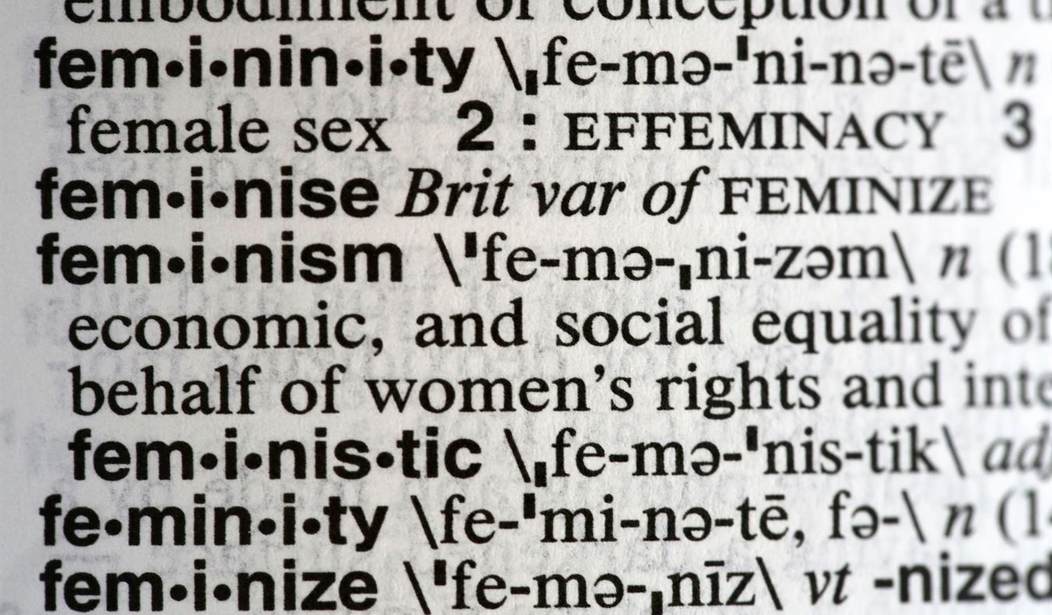The English language continues to be warped, particularly in the United States, by the ongoing debate over transgender policies, or at least that’s the goal of many activists. They have achieved a remarkable level of success in these efforts when it comes to many of the online dictionaries, with Merriam-Webster being among the most prominent. Some sharp-eyed readers noticed that the editors of the online version of the dictionary recently made their second revision to the listed definitions of the word “female.” Perhaps they felt that additional clarity was required since we have at least one member of the Supreme Court who is unable to define what a woman is because she has no formal training in biology. In the old days before the wokeness epidemic struck the country, it was simple enough to say that a female is a “person of the sex that is the opposite of male.” But that simply won’t do in the 21st century, apparently, so now that definition includes the phrase “having a gender identity.” (National Review)
Merriam-Webster’s online dictionary has caved to the trans agenda. In order to appease woke activists, the dictionary publisher has added a secondary definition of “female” that defines the term as “having a gender identity that is the opposite of male.” The key term here is “gender identity,” which demonstrates that Merriam-Webster maintains that gender is not directly connected to sex. A female is a woman. Trans-identifying males are not female. However, according to trans activists, men can be women.
This is not the only part of the definition that has changed in the online edition of Merriam-Webster. Notice the primary definition of female: “Of, relating to, or being the sex that typically has the capacity to bear young or produce eggs.” In Merriam-Webster’s tenth edition, the dictionary defines the noun female as “of, relating to, or being the sex that bears young or produces eggs.” The change in the online edition to include the phrase, “typically has the capacity” shows Merriam-Webster’s attempt to include trans-identifying males in the definition of female. While this phrase may refer to women who cannot bear children due to infertility, given their nod to “gender identity” in defining the word “female,” it is most likely another way to appease the trans community.
In addition to this new definition contrasting males and females, the other primary definition for “female” was also previously altered. An earlier edition only referenced “the sex that bears young or produces eggs.” That entry was subtly altered to include the phrase “typically has the capacity.” This obviously opens the door to applying the word female to those without that capacity. Yes, that might include actual women with infertility problems as noted by National Review, but it could also apply to men. You can see where this is going.
As noted above, Merriam-Webster is jumping on the bandwagon with those who somehow insist that “gender” is something separate from and disconnected from “sex.” Thousands of years of medical science have been summarily thrown out the window without one scintilla of new research emerging to show that we somehow managed to get this basic concept wrong for the entirety of recorded history. And now that language is being enshrined in our largest online language resources.
This isn’t Merriam-Webster’s first excursion into the deep end of the transgender language pool. As you may recall, their “Word of the Year” in 2019 was “they.” That’s a plural pronoun that’s been around as long as the language has existed, but the company chose to include it as a singular pronoun in a nod to the “non-gendered” crowd. I still refuse to use that one under any circumstances because using it that way makes people sound ignorant.
All of this is happening by design, obviously. In any aspect of societal debate, the ones who control the language control the argument. If they can force you to adopt their terminology, the fight is already halfway won. The more they manage to normalize new terminology, no matter how insane it may sound, the closer they are to establishing a “new normal” for everyone else. And that’s what you see happening here.
Personally, I don’t care what anyone chooses to call themselves. It’s still a relatively free country (for now, anyway) and you can call yourself a penguin for all I care. I have even been known to refer to people by an incorrect gender or with the wrong pronouns just out of politeness. But that’s something I do voluntarily via a choice that I intentionally make. The problems begin when you try to force the rest of us to adopt your language if we don’t choose to use it in our speech or writing.
This is yet another argument where we see one wing of the political spectrum lining up to fight over something that the majority of everyday Americans either don’t agree with or, at best, don’t view as a priority. Most anyone you meet on a daily basis knows that gender is simply a more polite word for “sex,” dating back to a time when sex was still a word not said in polite company. They also know that humans, as with almost all of the larger animals, come in two distinct sexes/genders, both of which are required to achieve reproduction and the continuation of the species. Even many of the people mouthing these new words so they can fit in with the woke crowd know this very well, but they’re simply afraid to say it aloud.
As with so many of the other crazy arguments we find ourselves embroiled in these days, there remains one piece of advice that may come in handy for you. Do. Not. Comply. (Unless you want to, of course.)








Join the conversation as a VIP Member